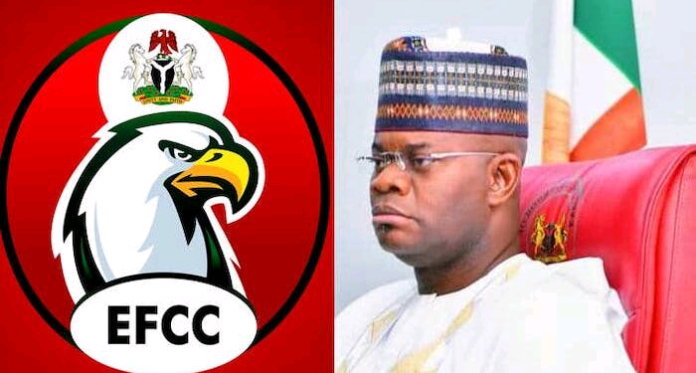The Economic Financial Crimes Commission’s relentless pursuit of Yahaya Bello has thrown Nigeria’s judicial system into a tailspin, launching a contentious debate about the agency’s commitment to justice and the rule of law.
With its controversial media trials and alleged disregard for due process, the EFCC has raised more questions than answers, leaving many to wonder if the agency is hell-bent on securing a conviction, no matter the cost.
And now, with its latest move to bring Bello before a Federal High Court in Abuja, despite a subsisting Kogi High Court order, the EFCC has thrown weights of fears that it may be playing a dangerous game of judicial roulette, where the integrity of the judiciary is the ultimate casualty.
As the stakes grow higher, one thing is clear: the outcome of this legal battle will have far-reaching implications for Nigeria’s democracy and the fight against corruption.
Recall that The agency’s chairman, Olanipekun Olukoyede, recently held a press conference where he made damaging allegations against Bello, including claims of withdrawing cash from the state government account to pay his children’s school fees in advance.
The principle of subjudice is meant to prevent the prejudicing of ongoing legal proceedings through public commentary or media trials.
However, the EFCC’s actions in this case have thrown caution to the wind, raising questions about the agency’s commitment to due process and the rule of law.
By holding a press conference and making defamatory statements against Bello, Olukoyede has not only compromised the integrity of the legal process but also undermined the judiciary’s authority.
To make matters worse, receipts of the payments made by Bello’s family members have surfaced online, contradicting the EFCC’s allegations and exposing the agency’s reckless pursuit of the former governor.
This development has led to accusations of defamation and a gross abuse of power by the EFCC.
The agency must be held accountable for its actions and reminded of its responsibility to uphold the law, not undermine it. The judiciary must also assert its independence and ensure that the principle of subjudice is upheld to prevent the miscarriage of justice.
In the end, the pursuit of justice must be done in a manner that respects the law and the rights of all citizens.
For example, the agency’s action described by Constitutional Lawyer Ewa Okpo as “trial by mischief”, has sparked outrage among legal experts and political analysts. Similarly, Dele Momodu, a chieftain of the Peoples Democratic Party (PDP), has also criticised the EFCC’s conduct, urging the agency to follow the rule of law and respect the rights of all citizens to a fair hearing.
In the same vein, Professor Nwoke Friday Chijioke, a former Vice President of the ECOWAS Court of Justice, has also denounced the EFCC’s approach, labelling it as an unfair trial and emphasising the need for discretion in investigations.
His words: ”The EFCC chairman’s press conference was really uncalled for. That is unfair trial. All these challenges are because of what I would call a media trial.
”An institution of justice should be in a position, especially when you are the investigator, carry out a discrete investigation. You do not need to involve the media.
”For example, the EFCC’s chairman interview was really, really uncalled for. It was uncalled for in the sense that you do not need to accord any privilege to Yahaya Bello. The law does not require according or giving of privileges to persons who are suspected of having committed an offence.’‘
EFCC must be held accountable for its actions and reminded of its responsibility to uphold the law, not undermine it.
In the pursuit of justice, institutions of justice like the EFCC must conduct investigations discreetly, without involving the media.
The agency must respect the rights of all citizens to a fair hearing and avoid selective prosecution. Only through such actions can we ensure that the fight against corruption is won without sacrificing the very fabric of our democracy.
We urge The EFCC to retrace its steps, respect the rule of law, and ensure that justice is served without prejudice or bias.
Little wonder, a coalition of CSOs, led by the Centre for Anti-Corruption and Open Leadership (CACOL), has condemned the EFCC’s actions as a gross disrespect for the rule of law and a dangerous harassment of Bello labelling the EFCC’s handling of the investigation as “oppression, persecution, and political witch-hunt”.
The EFCC invaded Bello’s residence without a formal invitation and has continued to engage in media trial. This is unprofessional and uncalled for. This action could put Bello’s life in danger. It is noteworthy to state that the EFCC should be held in contempt of court for disobeying a subsisting court order.
READ ALSO: Yahaya Bello: Selective prosecution by EFCC is unacceptable – Dele Momodu
The EFCC’s chairman should not allow emotions to cloud his judgment and he should not be seen to be misusing his power to persecute the former governor.
In the pursuit of justice, institutions of justice like the EFCC must conduct investigations discreetly, without involving the media. The agency must respect the rights of all citizens to a fair hearing and avoid selective prosecution. Only through such actions can we ensure that the fight against corruption is won without sacrificing the very fabric of our democracy.
The EFCC’s actions in Bello’s case are a test of Nigeria’s jurisprudence, and the outcome will have far-reaching implications for the country’s democratic governance and the fight against corruption.
























